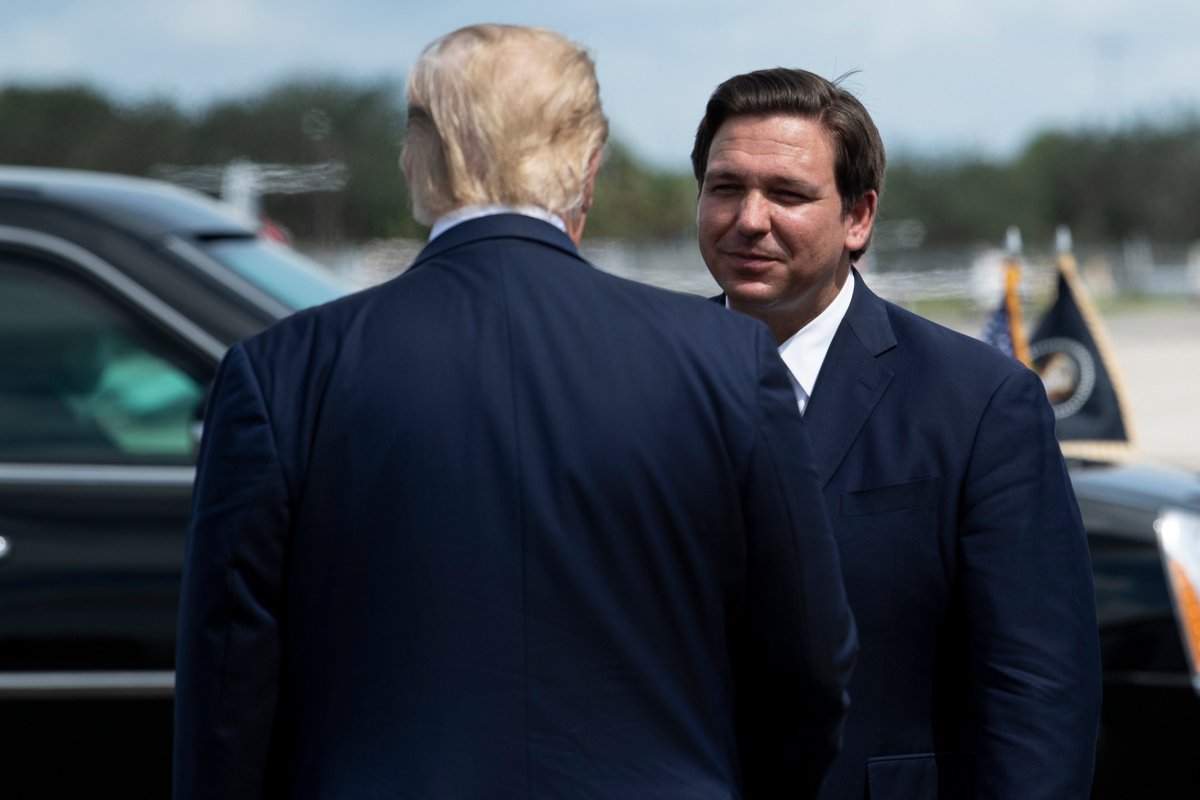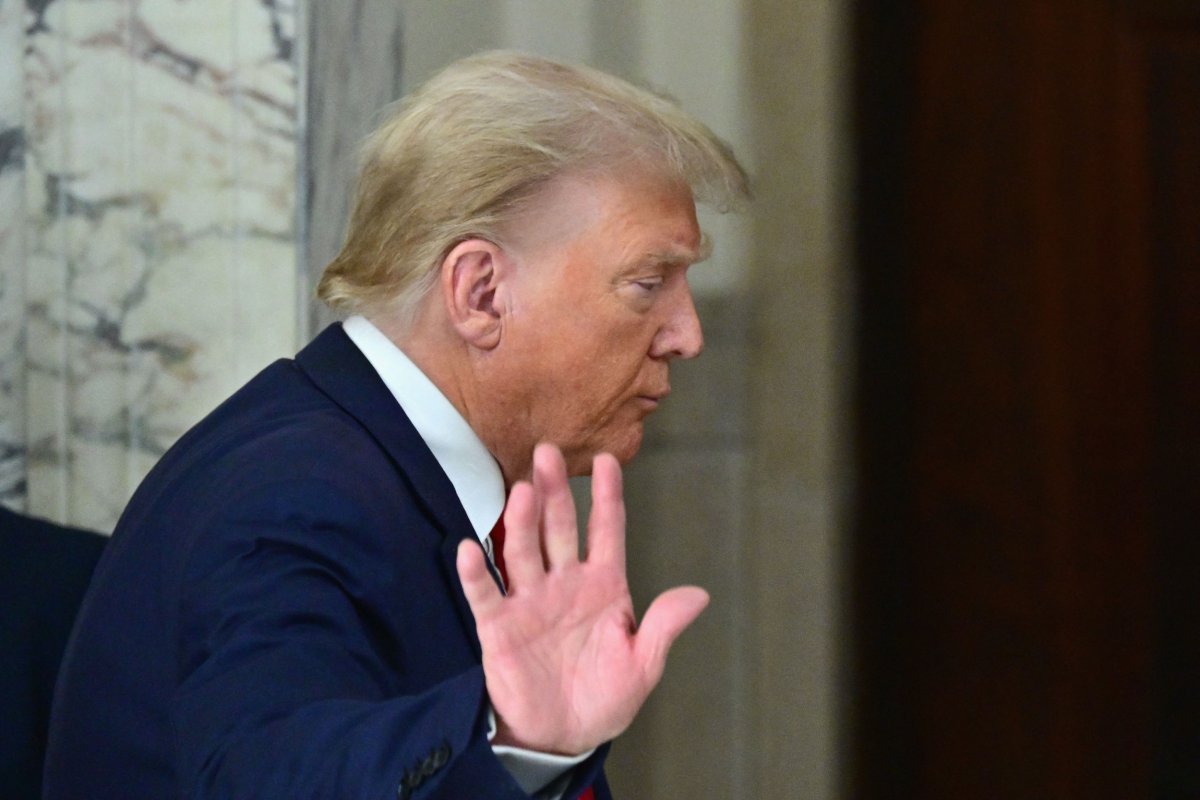-
Did Donald Trump’s Indictments Boost His Poll Numbers? - October 15, 2023
-
A portion of Mulholland Drive, damaged by mudslides in winter storms, reopens - May 26, 2024
-
‘Maybe You Don’t Want to Win’ - May 26, 2024
-
Donald Trump Putting Law Enforcement in Danger: Attorney - May 25, 2024
-
Avoid the waters of these 5 L.A. County beaches this holiday weekend, public health officials say - May 25, 2024
-
Bawdy Comedy ‘Anora’ Wins Palme d’Or at Cannes Film Festival - May 25, 2024
-
Map Shows Heat Wave Zone Spread Into Five New States - May 25, 2024
-
Azusa police arrest suspected slingshot-wielding vandal - May 25, 2024
-
Donald Trump Hammers Judge Ahead of Jury Instructions - May 25, 2024
-
Sometimes U.S. and U.K. Politics Seem in Lock Step. Not This Year. - May 25, 2024
Did Donald Trump’s Indictments Boost His Poll Numbers?
Donald Trump’s appearances last week in civil court, where he is accused of inflating the value of his property portfolio, was characteristically defiant, as he told reporters his legal troubles were a boon to his 2024 presidential campaign.
As well as the civil lawsuit, brought by New York Attorney General Letitia James, Trump faces 91 federal and state charges across four indictments, all of which he denies.
While the federal trials are yet to begin, Trump has claimed that each of his indictments has helped his 2024 presidential polling numbers. Republican primary polls show he is standing about 40 points ahead of Florida Governor Ron DeSantis.
A clip of Trump speaking outside court, shared on TikTok last Monday and since viewed more than 1.3 million times, showed him saying: “If I weren’t leading in all the polls or if I weren’t running, I wouldn’t have any of these cases.

Spencer Platt/Getty Images
“I wouldn’t be seeing you this morning, so we’ll go in and see our rogue judge, and we’ll listen to this man, and I think most people get it. People are getting it, I can tell you voters are getting it because every time they give me a fake indictment I go up in the polls and that has never happened before.”
It is not clear which specific polls he is referring to.
Throughout the year, poll aggregators such as FiveThirtyEight and Real Clear Politics have been tracking Trump’s standing in the GOP race, his standing versus Joe Biden in a hypothetical presidential contest, and his favorability among Americans.
Trump has faced four indictments this year: March 30 on Manhattan “hush money” charges; June 8 for allegedly handling classified documents; August 1 in Washington, D.C., regarding election interference; and August 24 in Georgia on racketeering and election interference charges.
To examine any potential impact of the polling average, Newsweek compared Trump’s average aggregated ratings before each indictment with those a week and two weeks after he was charged.
The data comparison suggests Trump’s polling received a bump following his first indictment—over alleged “hush money” payments, but the increase was not repeated after each subsequent indictment.
Polls change for many reasons. This data analysis does not assess reasons behind changes.
Newsweek has reached out to a Trump representative via email for comment.
How Trump’s GOP Polling Changed
- Looking at the week after the first indictment in the hush-money case, there was a clear boost to Trump’s numbers in the GOP primary race. Seven days after being charged, Real Clear Politics stated his primary poll numbers rose on average by about six points, from 45.7 percent on March 29 to 52.0 percent on April 7. The rating did not move significantly in the week after. FiveThirtyEight recorded a smaller initial leap, rising from 46.8 percent on March 29 to 51.9 percent on April 7. However, a week later, his score grew, securing almost 2 more percentage points by April 14. DeSantis was almost neck-and-neck with Trump in mid-February, polls show, but by late March DeSantis’ numbers began to decrease sharply.
- On June 7, the date before his Mar-a-Lago classified documents charges, Real Clear Politics reported Trump’s average primary approval rating was 54 percent; FiveThirtyEight recorded 52.8 percent. In the week after the indictment, Real Clear reported a 2-percentage-point loss; he would not recover his 54 percent support until August 10. FiveThirtyEight reported a dip of 0.2 percentage points, with no real clear change in fortunes until the end of the month.
- After Trump was indicted on August 1 on federal election interference charges, FiveThirtyEight reported a 0.2 percentage point rise and fall in seven and 14 days compared to his prior polling average. Real Clear Politics reported the reverse pattern; compared to the day before the indictment, Trump saw his average drop of 0.3 percentage points in the seven days after he was charged. By August 15, it increased by that amount over his pre-indictment rating.
- Trump’s charges in Georgia came before a fall in ratings. The day before his indictment, FiveThirtyEight recorded average support of 55.8 percent; by August 28, it was 52.6 percent, recovering to 56.6 percent by September 4. Real Clear Politics saw no such recovery, with Trump’s average dropping from 54.8 percent to 53 percent in the week after he appeared in Fulton County. He recovered 0.4 percentage points seven days later, but it took several more days before he pulled back the points he lost.
Overall, Trump has seen a boost in his numbers since his first charge. FiveThirtyEight has recorded a nearly 12 percentage-point climb in his average GOP primary standing since March 2023, at 58.7 percent currently. Real Clear Politics registered a similar uptick, reporting 57.4 percent average support at time of publication.

BRENDAN SMIALOWSKI/AFP via Getty Images
Real Clear Politics and FiveThirtyEight have provided polling averages throughout the year. The averages include polls from a wide range of surveys, rather than tracking changes in like-for-like polls. FiveThirtyEight describes its methodology in detail, avoiding especially large sample sizes, limiting extreme values, removing overlapping polls from individual pollsters,
Newsweek has reached out to Real Clear Politics for a copy of its polling methodology.
How Trump’s Favorability Changed
Trump’s indictments did not result in any noticeable improvement in what Americans have thought of him. His favorability, according to analysts, has mostly spun on a pin throughout 2023, with Americans consistently disapproving of Trump by roughly 52 percent to 56 percent.
Trump could, of course, justify his claim about indictment uplifts by pointing to individual polls. For example, one Fox News poll conducted after his indictment in Georgia showed a 10-percentage-point leap in his GOP primary ratings, compared to results recorded before the announcement.
As for results in a theoretical Trump vs. Biden 2024 presidential race, the competition has been neck-and-neck, with the indictments offering no clear boost for the former president.
What Analysts Say
Thomas Gift, director of the University College London Centre on U.S. Politics, told Newsweek that the overall uptick in Trump’s poll numbers cannot be “pegged neatly and temporally to each specific prosecution.”
“Since Trump’s indictments have begun, there’s an obvious positive trend line to Trump’s popularity among Republican voters,” Gift said. “To me, this is broadly consistent with the indictments helping Trump with the primary electorate.
“But it’s not necessarily the case that each successive indictment, in isolation, has buoyed Trump in the polls. It’s more a general effect than one that can be pegged neatly and temporally to each specific prosecution.”
Professor Lonna Atkeson, an election science expert at Florida State University’s College of Social Sciences and Public Policy, argued it may be much later in the campaign before attitudes shift toward his alleged crimes.
“Usually indictments do matter and convictions do matter and one might think in a general election campaign where those became issues, which they would, that they would have negative consequences, assuming they are seen as legitimate,” Atkeson told Newsweek. “Will the election turn on the veracity of the indictments?”
Other presidential hopefuls have previously faced legal issues. Ahead of the Watergate Senate hearings, President Richard Nixon enjoyed approval ratings in the mid-60s, which quickly slumped as Americans learned more about his crimes and as congressional investigations played out live, research by Pew found.
President Bill Clinton, however, saw little impact in his popularity during and after his impeachment, Pew reported. Like Trump, Atkeson told Newsweek, Clinton argued that the charges against him were politically motivated.
“So, a lot depends on how [Trump’s indictments] play out in court, and with it on TV voters will get to see and determine at least, in part, on their own perceptions,” Atkeson said.
“Second, it matters whether GOP elites turn on the former president or they stay with him. So far only [former New Jersey Governor Chris] Christie is out there strongly against Mr. Trump. That’s not enough. If the GOP message is corruption of justice and that’s fortified by a circus in court, well you can see how things are uncertain, and could play out differently.”

ANGELA WEISS/AFP via Getty Images
There is little evidence in the polls that Trump’s indictments have hurt his chances in 2024, which is “pretty remarkable,” according to professor David C. Barker, director of the Center for Congressional and Presidential Studies at American University.
“The reason for that is pretty simple, though,” he told Newsweek. “In these polarized times in which no amount of information is considered credible on the right if it emanates from traditional sources of authority [the press, academia, the scientific community], all the indictments are seen as part of a grand witch hunt designed to keep ‘the good people down.'” Barker said.
“Indeed, by going after Trump, it fuels defensiveness on the part of his supporters. They have a bunker mentality, circling the wagons to protect their guy from his grand inquisitors. In short, the more the ‘elites’ appear to despise Trump [the indictments are viewed that way, and they aren’t wrong], the more they feel compelled to defend him.”
However, Brian Ward, professor of American Studies at Northumbria University, told Newsweek that a lack of alternatives might be aiding Trump’s cause.
“Die-hard Trumpers always will support Trump regardless,” he said. “The absence of viable or attractive GOP opponents, faltering campaigns, etc….may encourage some who have grave doubts to hold their noses and support him again, and some of those will buy in to, or pretend to buy in to, the ‘witch-hunt’ myth. These two constituencies may be boosted by the indictments.
“Meanwhile, others clearly feel the MAGA/Trump moment is over or ending and are looking for ways to recalibrate their position in the GOP, without quite knowing how to do it, who to shift allegiances to, especially while the MAGA/Trump elements still seems so strong, and potentially decisive. They may still be publicly supportive, as dissing the Dems/Biden is low-hanging fruit, but the cracks are showing and the levels of support are unlikely to rise, I think.”
With the 2024 presidential election still more than a year away, anything could happen.
“There could be kind of a snowball effect or a cumulative effect of, you know, multiple indictments and new information that could emerge that could kind of shake people from long-held views about Trump,” professor Costas Panagopoulos, an election campaign expert at Northeastern University, told Newsweek.
“But it it would have to be some pretty damaging new information, because attitudes are just generally resistant to shifts and it seems that attitudes about Trump in particular are especially impervious.”
Source link































